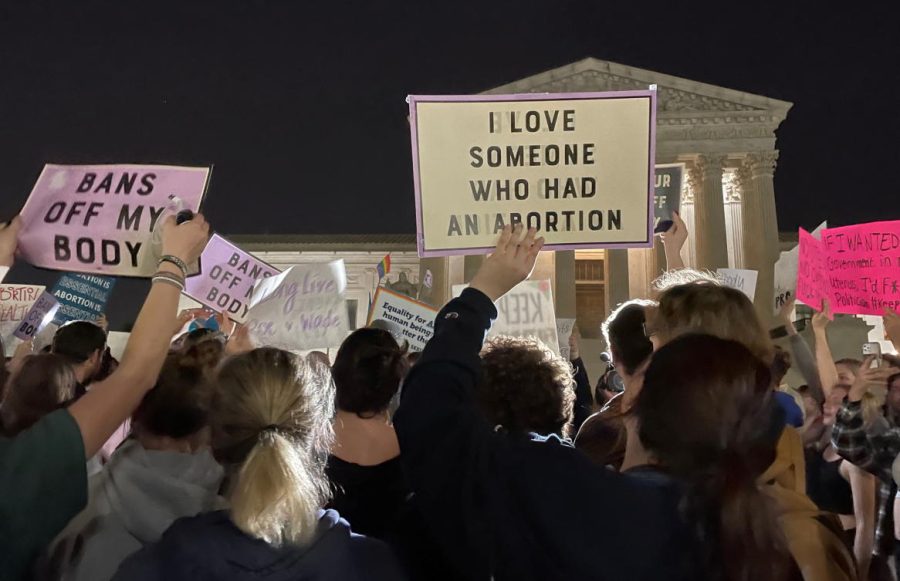Women v. Supreme Court
Supreme Court puts women’s rights at stake with drastic decision
May 31, 2022
When Norma McCorvey filed a petition against her local district attorney in 1970, she of course hoped to cause change, however little did she know the controversy Roe would still carry 50 years later.
Under the pseudonym, Jane Roe, Norma McCorvey – a twenty-two year old woman who found herself unable to care for a baby – petitioned the courts for her right to have an abortion. At the time of her petition, McCorvey had already placed two daughters up for adoption and did not want to go through with another pregnancy, but Texas had laws dating all the way back to 1854 making it nearly impossible to have a safe, healthy, and legal abortion.
According to Texas State Penal Code 1191, anybody who aided in an abortion would be held criminally liable and could face two to five years in prison. To further 1191, Penal Code 1192 stated that if anybody is known to have helped a woman obtain an abortion would be considered an accomplice to a crime. Texas State Penal Code 1193 sets forth a fine of $100-$1,000 for breaking any other penal code relating to abortion, and Code 1194 says that a mother who passes away during an illegal abortion, would be considered murdered.
Although abortion was legal and easily accessible in other states and allowed in Texas when necessary to save the life of the mother, both practices were vague and did not fully guarantee that a woman would not be punished if she went through with the procedure.
McCorvey’s suit went all the way to the Supreme Court and abortion was made legal in all states due to the federal supremacy clause in 1973. Almost fifty years later, Roe v. Wade is potentially being overturned.
The public’s first glimpse at the shocking decision to overturn Roe v. Wade was in early May when Politico, a news service, leaked a draft written by Supreme Court Justice Samuel Alito. The draft was said to be circulated around the courts in early February, with the final decision estimated to be published in late June.
Although Alito’s draft is the first major pending decision to be exposed due to a leak of information in the Supreme Court, it is not the first case in which the rulings have been shared before the court’s announcement. In 1973, the rulings in the original Roe v. Wade case were leaked to the press hours before the decision was made public.
 In terms of the draft’s content, Alito repeatedly states that Roe and Planned Parenthood v. Casey were “egregiously wrong from the start,” and he continues to use negative language to invalidate Roe v. Wade’s reasoning. Alito also states several times that abortion is “unconstitutional” and contradicts America’s founding values and customs.
In terms of the draft’s content, Alito repeatedly states that Roe and Planned Parenthood v. Casey were “egregiously wrong from the start,” and he continues to use negative language to invalidate Roe v. Wade’s reasoning. Alito also states several times that abortion is “unconstitutional” and contradicts America’s founding values and customs.
Protests, petitions, and discussions have erupted across the country in response to the leaked draft. At nationwide protests, women use the phrase “Ban Off Our Bodies,” a phrase Planned Parenthood supports wholeheartedly. In turn, the Supreme Court and Justice Alito have faced widespread public criticism as of late. But this isn’t the first time the Supreme Court (or Justice Alito for that matter) have been under public fire.
Obergefell v. Hodges (2015) was another landmark Supreme Court decision that legalized same-sex marriage in all 50 states. Justice Alito was one of the four judges who voted against same-sex marriage in a 5-4 decision. His public opposition to gay marriage did not end there; in 2020, he stated that same-sex marriage was a “alteration of the constitution” that was just as unlawful as Roe v. Wade. As expected, this sparked various protests and backlash against Justice Alito and the other Justices that voted against same-sex marriage. With Alito’s constant derogatory comments, some people fear that the overturning won’t stop here.
Regardless of sexual discrimination, Roe v. Wade boils down to a philosophical question with no definitive answer. Many Pro-Life activists believe that life begins at conception, whereas others believe that life begins when a child is born. However, pro-choice advocates acknowledge that the life of a potential child should not take precedence over the life and choices of a mother. Regardless of one’s point of view of the embryo, abortion should be protected to ensure a woman’s mental, emotional, and physical well-being.
When it comes to physical well-being, many people are unaware of the challenges that a pregnant body faces. In the best-case scenario, a woman’s body will return to its previous state six to eight weeks after birth, according to the Family Doctor. This does not take into account cesarean births or any other complications. In terms of mental health during pregnancy, one in every five women experiences mental health issues, with anxiety and depression being the most common. Not to mention postpartum depression which can occur after giving birth. Suicide is responsible for roughly 20% of postpartum deaths and can have long-term effects on the mother.
In the end, this draft endangers more than just women’s lives. This Supreme Court leak jeopardizes not only the constitutionality of Roe v. Wade, but also the constitutionality of any other ruling protected under the same clause, the right to privacy, such as Obergefell v. Hodges and Loving v. Virginia.
Some may argue that there is nothing ordinary citizens can do, but the beauty of the American government is that everyone has a platform to express their views. Stay informed about current issues, policies, and politics, and vote when you are eligible. As cliche as it sounds, one vote does make a difference in the long run.


